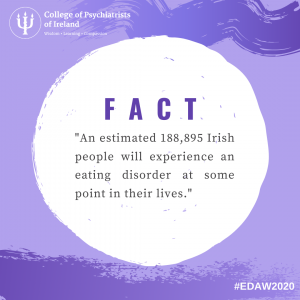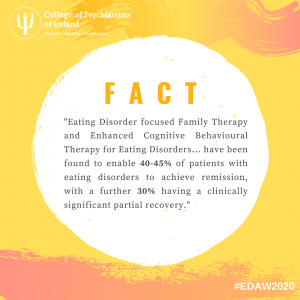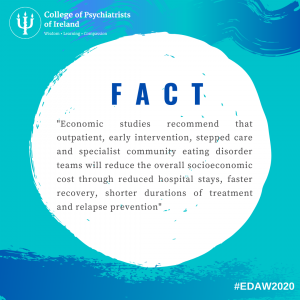8 Common Myths About Eating Disorders
FACT: An estimated 188,895 Irish people will experience an
eating disorder at some point in their lives. Approximately
1757 new cases develop each year in Ireland in the 10-49 age
group.Recently published data from Finland highlights that
eating disorders are a common public health concern among
youth and young adults, affecting 1 in 6 females and 1 in 40
males. Adolescence is the peak age of onset for Anorexia
Nervosa with recent studies, including the UK and Ireland,
suggesting an increase of incidence in children aged 12 and
younger.
FACT: Eating disorders are more common in females although the gender gap has narrowed. Eating
disorders in boys and men are traditionally under-recognised and under-diagnosed. They are
estimated to account for 25% of Anorexia Nervosa and Bulimia Nervosa cases and yet only 1% of research
published on eating disorders focuses on males. Eating disorders affect people of all genders, age, races,
ethnicities, sexual orientations, and socioeconomic status.
FACT: Eating disorders are serious diagnosable mental health disorders. The five main eating
disorders are Anorexia Nervosa (AN), Bulimia Nervosa (BN), Binge Eating Disorder (BED), Avoidant
Restrictive Food Intake Disorder (ARFID) and Other Specified Feeding and Eating Disorders (OSFED) as
classified in both the DSM V and ICD-11.
FACT: Eating disorders occur at all weights and body shapes. Although weight loss is a defining
feature of Anorexia Nervosa, it is not the case with Bulimia Nervosa and binge eating disorder. Atypical
Anorexia Nervosa is where all the criteria for Anorexia Nervosa are met, but despite significant weight
loss, weight is in the normal range. It is not a less severe eating disorder and yet is associated with
challenges for early recognition.
FACT: Eating disorders have the highest mortality and morbidity risk of all mental health disorders.
Anorexia Nervosa is the most lethal. Current data for adolescents indicate that 10% of those who present
with the disorder will die prematurely from it within 10 years of onset. The causes of death from Anorexia
Nervosa are commonly physical due to the effects of starvation. From a mental health perspective,
people with eating disorders also have a much higher lifetime risk of having another mental health
disorder such an anxiety disorder, a mood disorder especially depression, substance use disorders
and impulse control disorders. 20% of fatalities associated with Anorexia Nervosa are accounted for by
suicide.
FACT: Despite the relatively higher levels of mortality with
eating disorders, there have been improvements in the
prognosis over the last decade. Eating Disorder Focused
Family Therapy (FBT/FT-AN) and Enhanced Cognitive
Behavioural Therapy for Eating Disorders (CBT-E) are current
first line evidence based treatments that have been found to
enable 40-45% of patients with eating disorders to achieve
remission, with a further 30% having a clinically significant
partial recovery.
Adolescent patients have an even better prognosis with early
intervention. An evidence-based, early intervention care
pathway (FREED) has been developed in the UK for 16 to 25 year
olds with an eating disorder of less than 3 years duration with exciting improvements in waiting times,
symptoms, patient experience and cost savings.
FACT: As with many mental health disorders, the causes of eating disorders are a complex mixture of
biological, psychological and social factors. 40-60% of the estimated causality of Anorexia Nervosa and
Bulimia Nervosa is heritable or genetic. An exciting global study published results last year in Nature
Genetics suggesting that the genetic origins of Anorexia Nervosa are both metabolic and psychiatric.
The two well-known most common risk factors for developing an eating disorder are body
dissatisfaction and dieting at any weight. While there is little doubt we have much still to learn about the
causes of an eating disorder, we do know that families are not to blame and in fact they are best
recognised as a significant resource by both people with an eating disorder and for those who treat
them.
FACT: Only 5-15% of people with eating disorders seek help and
85% report that it is hard to access treatment, with stigma
playing a large role. And yet most people can and do recover
from eating disorders if they get effective, evidence-based
treatment from Eating Disorder-trained staff. There are
devastating psychosocial consequences associated with
untreated eating disorders. Economic studies recommend that
outpatient, early intervention, stepped care and specialist
community eating disorder teams will reduce the overall
socioeconomic cost through reduced hospital stays, faster
recovery, shorter duration of treatment and relapse prevention.
The majority of eating disorders can be treated in the
community, with hospitalisation being reserved for those who need it. In response to this international
best practice , the HSE in Ireland, through the National Clinical Programme for Eating Disorders, has
developed a strategic vision for the future so that people of all ages throughout the country should be
able to access the necessary services to support them towards as full a recovery as possible.
Resources:
The HSE National Clinical Programme for Eating Disorders (NCP-ED) is a collaborative initiative between the HSE, the College of Psychiatrists of Ireland, and BodyWhys – the national support group for people with eating disorders.
Bodywhys: Bodywhys is the national voluntary organisation supporting people with eating disorders. Bodywhys is committed to the belief that people can and do recover from eating disorders. They strive to empower people affected by eating disorders to access information, support and treatment.
PO Box 105, Blackrock, Co.Dublin
Helpline: 01 2107906
Email: alex@bodywhys.ie
Website: www.bodywhys.ie



